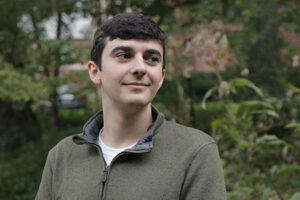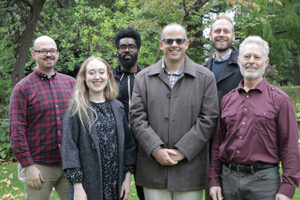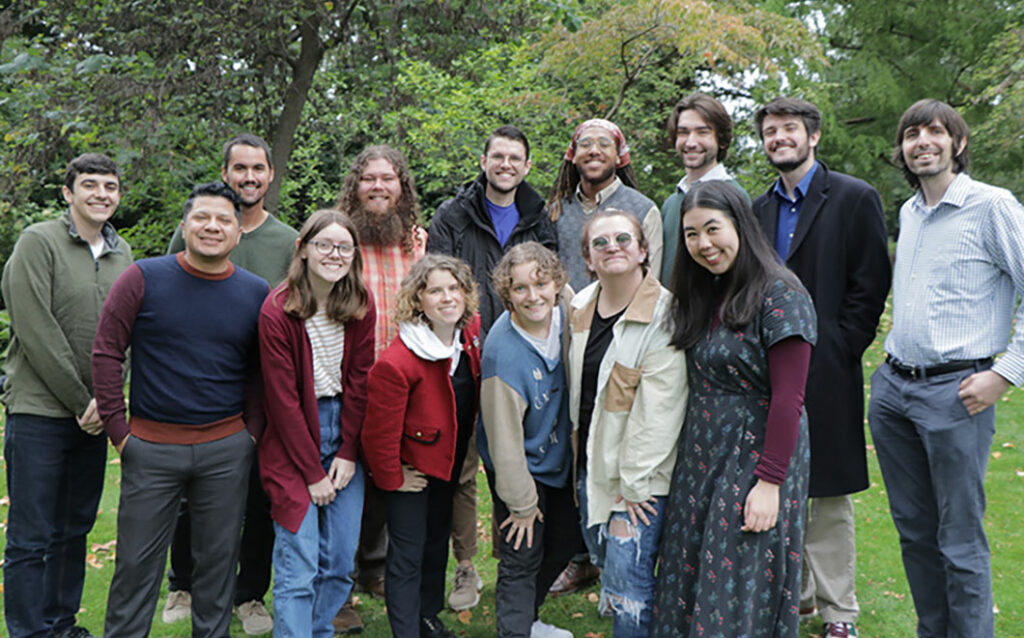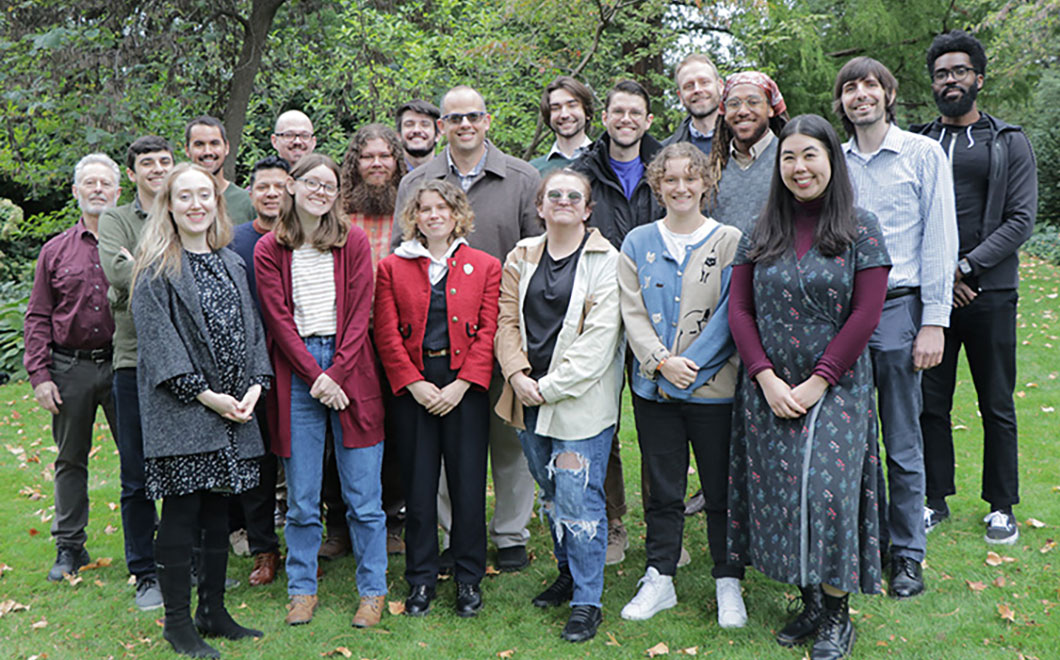
Ryan Galik, who completed his master’s degree in Music Theory in Spring 2024, earned one of two Student Presentation Awards at the annual Society for Music Theory conference. It is the highest honor given by the organization for student papers and one that had never been awarded to a master’s level student.
In the final year of his master’s work, Ryan Galik did something that has, as far as anyone knows, never been done, and it reflects the strength of the degree program he recently completed.
Each year, the Society for Music Theory hosts a national conference where faculty members and a few doctoral students present a variety of music theory papers. At the conference in Denver last fall, one of two Student Presentation Awards went to Galik. It was an unprecedented decision by the jurors to grant a master’s student an honor always awarded in the past to doctoral students sharing their dissertation research.
The recognition of Galik’s work speaks volumes of the caliber of students and the quality of mentoring opportunities available to them in the Michigan State University Music Theory area in the College of Music, said James Sullivan, assistant professor of music theory. Sullivan has taught at MSU for five years and explained that the award granted for Galik’s project is remarkable for a master’s student.

MSU Music Theory faculty lead a program that has a 100% placement rate into top Ph.D. programs around the United States. From left, Nick Schumacher, Cara Stroud, Richard Desinord, Michael Callahan, Patrick Johnson, and Gordon Sly. (Not pictured: James Sullivan)
“What it means is that our students are doing Ph.D.-level research in our master’s program,” he said. “This is one of the biggest awards any of our students has received. It shows that we have students who conduct research at levels that are years beyond what is typically seen in music theory master’s programs across the country.”
Galik, a New Jersey native, completed master’s degrees in Music Theory and Composition at MSU in Spring 2024. His success, including during the application process to Ph.D. programs, is indicative of the opportunities available to MSU music theory students: robust coursework, one-on-one mentoring from dedicated and skilled faculty members, interactions with visiting scholars, a weekly music theory colloquium series, a supportive community of students, and funding to travel to conferences to present, learn, and build a professional network.
“Our master’s students in Music Theory have a 100% placement rate into the top Ph.D. programs, which reflects their hard work as well as the outstanding opportunities we provide to them,” said Associate Professor of Music Theory and Chair of the Music Theory Area Michael Callahan. “Ryan did tremendous work in his time here, and he represents the dedication of our students as well as the effectiveness of the program our faculty created at MSU.”
Galik said his paper, titled Don’t Pop the Bubble: Intersections of Ambient Music, Attention, Expectation, and Flow in Tim Hecker’s ‘Virgins,’ was presented during a 20-minute talk last November followed by a 10-minute question and answer session. He received notification in December of the award.
“The presentation started as a seminar paper with MSU Assistant Professor of Music Theory James Sullivan. I decided to start presenting at different conferences and continue to refine it. With ‘Don’t Pop the Bubble,’ I examine an album by an electronic artist named Tim Hecker. It’s called Ambient, but it doesn’t sound very ambient. I study why it’s called ambient and how we hear it that way,” Galik said.
He added that MSU faculty have been nothing but supportive, encouraging him to attend as many conferences, events, and workshops as he can. In addition to Denver, his opportunities took him to Baltimore, Salt Lake City, and Vancouver, among other places.
“A lot of the papers they have us write in class are geared toward a future use. Rather than give us exams, they say ‘here’s a paper you can write, and we want you to submit it to these places.’ They help guide us along toward the next steps,” he said.

Ryan Galik (far left) said that Music Theory faculty foster community between students that encourages teamwork and collaboration, and he is grateful for the support received from his peers and professors in writing and presenting his award-winning paper at the Society for Music Theory conference last fall.

Talk about supportive! Matthew Oakes lifts up his fellow Spring 2024 graduate Ryan Galik at a fun team building event last fall, showing how Music Theory students are incredibly helpful to each other at Michigan State University.
Galik said the Music Theory faculty foster community between students that encourages teamwork and collaboration, and he is grateful for the support received from his peers and professors.
“All of the faculty have had me knocking on their door multiple times asking for help, revisions, and feedback. They’ve been very patient and very helpful,” he said. “Everybody on the faculty has been critically important, and all of the current theory students and some that have since graduated, have been really helpful to me.”
Since the conference, Galik received offers to pursue his doctorate from five outstanding Ph.D. programs: Florida State University, the City University of New York, Northwestern University, Indiana University, and the Eastman School of Music. He has chosen to attend Eastman, where he will hold the university’s most generous doctoral fellowship.
“MSU doesn’t have a Ph.D. in my area; otherwise, I’d be applying here,” he said. “There’s a pretty small cohort of music theory students, about 10 or 12 of us, but it’s such a good environment. We work very closely, are not competitive at all, and are able to have fun while working on theory things.”
One of the things MSU music theorists will be working on together is the Pedagogy Into Practice conference being held in Oklahoma in May. Included in the national and international conference are Callahan and fellow theory faculty member Professor Gordon Sly – a keynote speaker – along with Galik and fellow students Brendan McEvoy and Kellin Tasber. In addition, six MSU Music Theory alums will present. They joy that emanates from this serious and supportive community is clear, especially when one of them achieves what Galik did in Denver.
“Ryan is one of my students, so really, this is one of the highlights of my career so far,” Sullivan said. “The fact that he’s won this award on a project that he’s worked on with me, that means a lot to me personally and professionally. I’m really happy and excited for him.”
If the level of contributions MSU Music Theory is making to the upcoming conference in Oklahoma is any indication, the success of Galik at an early age will be far from the last this program will celebrate.






